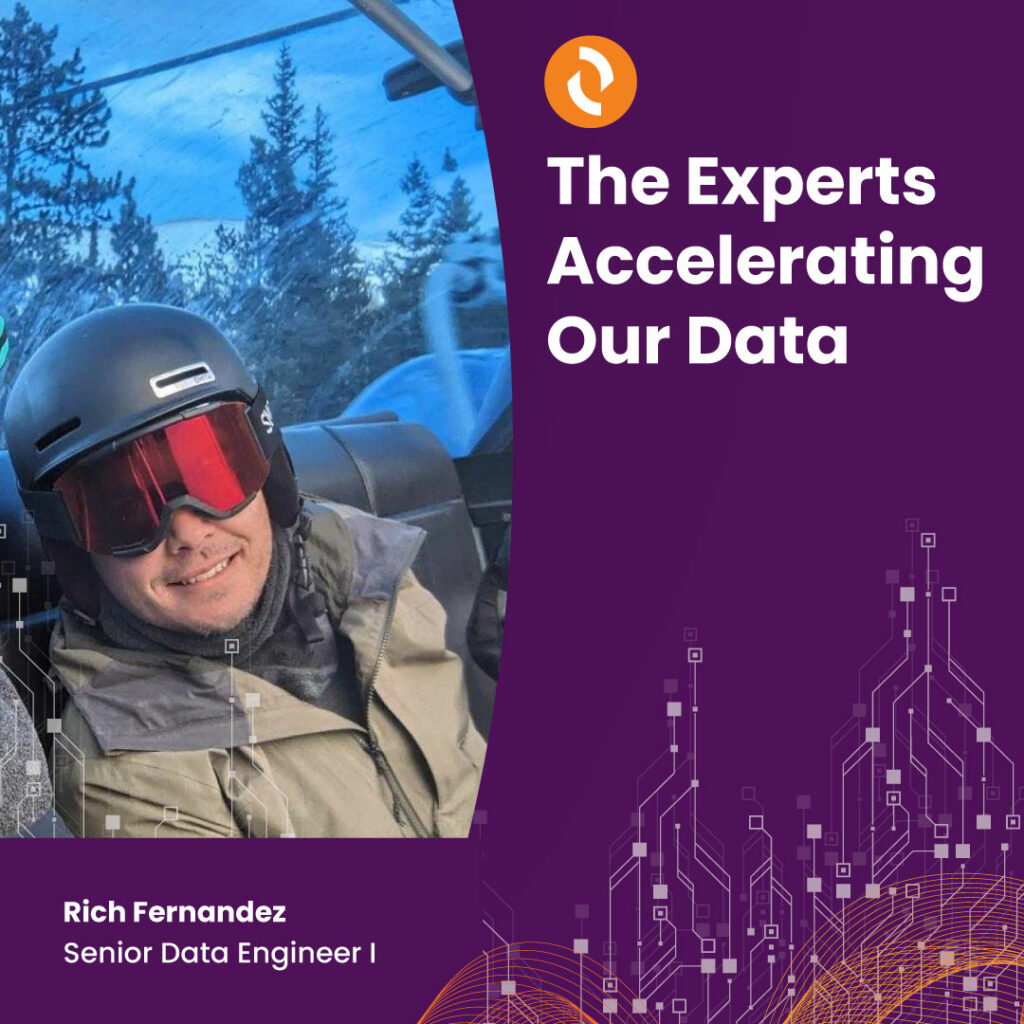Spotlighting Our Engineering Team: The Experts Accelerating Our Data (Rich Fernández)
Author:
Verana Health
We’re shining a spotlight on a few of our Engineering team members at Verana Health. This team of more than 40 bright minds is responsible for the development of sophisticated pipelines and platforms that allow us to ingest and curate a high volume of de-identified healthcare data that can help accelerate research and improve patients’ lives.
In this blog, we spotlight Rich Fernández.
Q: How would you explain your role?
A: As a senior data engineer, I facilitate our Engineering team to ensure they’re set up for success and have the tools necessary to get code into production as quickly, and as safely, as possible. This involves setting up Github Actions for continuous integration/delivery to test and lint our code into pre-production environments, adding release notes to Confluence (team documentation), and building data pipelines in Airflow (workflow orchestration system) and Databricks (all-purpose data platform) with Python (programming language) and Amazon Web Services (AWS – cloud computing platform).
In addition, I help our internal team validate data with JSON-Schema (data configuration template), which allows fine-grained control over validation. I’m currently working with our mapping clinicians to build a sustainable process with structured query language into our Databricks environment. This year, I will also be working with images and closely with client-facing data applications.
Q: What attracted you to the field of Engineering?
A: I have a relentless curiosity and desire to automate and understand business problems in order to solve them in ways that only programming solutions can provide. I taught myself how to program early on in my career, and while the learning can seem boundless, you begin to notice a lot of similarities across different technologies, tools and methodologies. My background mostly deals with automation, Python, AWS, and all areas of data engineering including analysis, visualization, pipelines, and governance. Lately, I’ve been on a functional and type-driven development kick and will continue to expand into machine learning (ML) engineering.
Q: What attracted you to Verana Health?
I’m personally invested in the company’s drive to help clinicians and life sciences companies find solutions as quickly as possible, so that patient outcomes can be resolved sooner, rather than later.
A: My family and I are personally affected by the specialty clinical registries (ophthalmology, neurology and urology) that Verana Health partners with to produce quality real-world data. I’m personally invested in the company’s drive to help clinicians and life sciences companies find solutions as quickly as possible, so that patient outcomes can be resolved sooner, rather than later.
Q: What inspires you to do this work?
A: I’m inspired by the curiosity of my co-workers and their willingness to learn and adapt on the fly. Working directly with architects and my technical manager makes it easier to implement new ideas and quickly identify new solutions.
Q: What is the most rewarding part of your job?
A: I believe that learning to the point where things fit nicely together and can be expanded upon, and future-proofed for years to come, is a reward in and of itself. Everyone in Engineering comes from different backgrounds and different specialities, so I enjoy witnessing everyone’s “aha moments,” as we learn and grow together.
Q: What advancements do you see in your field in the next 5 years?
A: I think in this coming age of artificial intelligence (AI), the need for innovation and curiosity will be even greater, as AI is only as smart as the crowd. We should be able to do more with less, and as technologies converge, we should be able to take on more volume, variability, and increasing responsibilities. I believe the current wave of AI will help move the needle in two ways:
- Allow people to become more interested in programming and learn faster.
- Create a need for those who don’t necessarily understand the technology, or the results they receive, to seek guidance from experienced engineers who can correct and realize the applications that people desire to deploy.
The old adage of automation “creating” more work is true now, more than ever, and so the capabilities of all companies boats will float and new interaction models and better innovations will expand the pie greatly. Many may be caught off guard, if they’re not willing to grow and adapt.
I also foresee that tools such as Unison language (distributed functional program) and MicroPython (embedded Python)/PyScript (Python in the browser) will completely revamp and overhaul how we promote code without all the ceremony to push the industry forward, allowing for more decentralization in the economy. In the immediate term, I would say that the web/mobile development gold rush is mostly complete and that ML and embedded systems will have more of a need for increased expertise and improvement.
When Rich is not flexing his curiosity and innovation with data-driven applications, he enjoys skiing (Photographed at Copper Mountain in Colorado).


Let's Accelerate Research Together
To learn more about Verana Health, please fill out the information below and our team will follow up with you as soon as possible.

